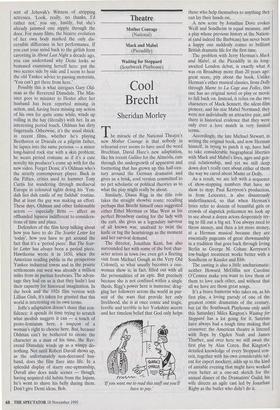Theatre
Mother Courage (National) Mack and Mabel (Piccadilly) Waiting for Stoppard (Southwark Playhouse)
Cool Brecht
Sheridan Morley
The miracle of the National Theatre's new Mother Courage is that nobody in rehearsal ever seems to have used the word Brechtian. David Hare's new adaptation, like his recent Galileo for the Almeida, cuts through the undergrowth of apparatus and footnoting that has grown up this half-cen- tury around the German dramatist and gives us a brisk, cool version committed to no pet scholastic or political theories as to what the play might really be about.
Similarly, Diana Rigg in the title role takes the straight showbiz route: recalling perhaps that Brecht himself once suggested either Ethel Merman or Mae West as his perfect Broadway casting for the lady with the cart, she gives us a legendary survivor of all known war, unafraid to twist the knife or tug the heartstrings as the moment and her survival demand.
The director, Jonathan Kent, has also surrounded her with some of the best char- acter actors in town (we even get a fleeting visit from Michael Gough as the Very Old Colonel), so what usually becomes a one- woman show is, in fact, filled out with all the personalities of an epic. But precisely because she is not confined within a single thesis, Rigg's power here is immense: drag- ging her followers across the world in pur- suit of the wars that provide her only livelihood, she is at once comic and tragic, terrific and terrible in her Yorkshire accent and her timeless belief that God only helps If you want me to read this stuff out you'll have to pay.' those who help themselves to anything they can lay their hands on.
A new score by Jonathan Dove evokes Weill and Sondheim in equal measure, and a play whose previous history at the Nation- al (and indeed the Barbican) has never been a happy one suddenly comes to brilliant British dramatic life for the first time.
The problem with Jerry Herman's Mack and Mabel, at the Piccadilly in its long- awaited London debut, is exactly what it was on Broadway more than 20 years ago: great score, pity about the book. Unlike Herman's other musical classics, from Dolly through Mame to La Cage aux Folles, this one has no original novel or play or movie to fall back on. Instead, it relies on the two characters of Mack Sennett, the silent-film pioneer, and his star Mabel Normand; they were not individually an attractive pair, and there is historical evidence that they were only ever a love match in very limited terms.
Accordingly, the late Michael Stewart, in writing the original book, and now Herman himself, in trying to patch it up, have had to take considerable biographical liberties with Mack and Mabel's lives, ages and gen- eral relationship, and yet we still deep down don't really care about either of them the way we cared about Marne or Dolly.
As a result, we are left with a sequence of show-stopping numbers that have no show to stop; Paul Kerryson's production, in from Leicester, is also disastrously underfinanced, so that when Herman's lyrics refer to dozens of beautiful girls or crowds of slapstick policemen we look up to see about a dozen actors desperately try- ing to fill out a big set. You always need to throw money, and then a lot more money, at a Herman musical because they are essentially pageants of great showmanship in a tradition that goes back through Irving Berlin to George M. Cohan: Kerryson's low-budget treatment works better with a Sondheim or Kander and Ebb.
The casting is also a little uncharismatic: neither Howard McGillin nor Caroline O'Connor make you want to love them or them to love each other, and without that all we have are those great songs.
It's a brave humorist who takes on, as his first play, a loving parody of one of the greatest comic dramatists of the century, but (at the Southwark Playhouse only until this Saturday) Miles Kington's Waiting for Stoppard has a lot going for it. Satirists have always had a tough time making that crossover; the American theatre is littered with flops by Ogden Nash and James Thurber, and over here we still await the first play by Alan Coren. But Kington's detailed knowledge of every Stoppard con- ceit, together with his own considerable tal- ent for expert mockery, adds up to the kind of amiable evening that might have worked even better as a one-act sketch for the annual dinner of the Dramatists' Guild; his wife directs an agile cast led by Jonathan Rigby as the butler who didn't do it.


















































































 Previous page
Previous page